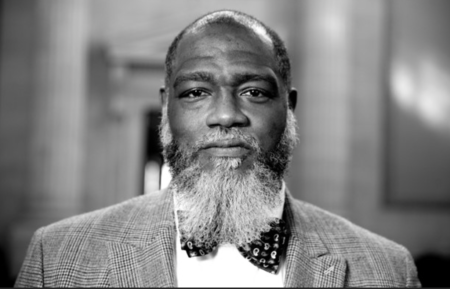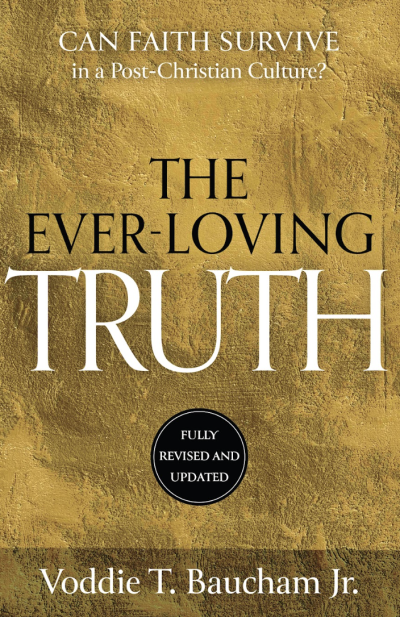Voddie Baucham on how faith can survive post-Christian culture that 'detests' biblical Christianity (pt. 2)

Read part 1 of Voddie Baucham's interview with The Christian Post here
When Voddie Baucham first penned The Ever-Loving Truth: Can Faith Survive in a Post-Christian Culture? in 2004, he was concerned that the dominant ideology of the day, secular humanism, was making biblical truth all but obsolete.
Fast forward nearly two decades, and, according to the 54-year-old dean of theology at African Christian University in Zambia, truth is still under attack in today's society, much like it was back then, with a shift from secular humanism to a radical Marxist approach.
“But really, at the end of the day, it's the same thing,” he told The Christian Post. “It's the idea that either there is no truth or that truth is a social construct; knowledge is even a social construct. And in both instances, Christianity, and really anyone else who proclaims that there is absolute truth, becomes the enemy of the ideology of the day.”
In September, Baucham is releasing a revised and updated version of his bestselling book, which he hopes serves as a valuable resource for Christians seeking to navigate increasingly turbulent cultural waters.
In his book, Baucham draws parallels between the early Church's experiences in pre-Christian Rome and the present-day challenges, highlighting the pressure to conform to prevailing ideologies while avoiding interfering with cultural norms.
“In the early Church, there was this pressure to conform to the religious ideologies of the day,” he said. “There was this pressure that said, ‘It’s OK for you to practice your Christianity; your Christianity just can't be allowed to interfere with our Roman religion.’ Today, we see the same thing. People are saying, ‘Listen, I don't have a problem with Christianity, per se, as long as that Christianity stays within the four walls of the church and does not try to impose itself on the broader culture, and as long as that Christianity does not prevent you from bowing to the idols of the day.’”
“The minute your Christianity causes you to oppose same-sex marriage or causes you to oppose abortion, or causes you to oppose so-called ‘gender-affirming care,’ and so on and so forth, those things that really are the idols of the culture today — when your Christianity steps into that realm, that's the minute that you experience the various forms of opposition and potentially persecution.”

According to Baucham, in post-Christian America, only certain versions of Christianity are “acceptable," the “watered down social gospel, the food bank, and liberal political activist kind of version of Christianity.”
“These things have always been OK because they remove the offense of the Gospel,” he said. “Once the offense of the Gospel is there, then all of a sudden, we're outside the camp.”
The early Church, the pastor said, knew how and when to draw lines because they were outsiders in the larger cultural context. In contrast, Christians in the Christian West have been the dominant ideology for a long time, shaping the culture and assuming that everyone else shares their perspectives.
With the cultural shift away from Christianity, Baucham contended, Christians are now unsure how to respond and navigate in a world where their assumptions are no longer dominant but perceived as detestable.
“We don't know how to respond. We really don't know what to do. We don't know how to play the game when it's not in our stadium,” he said. “We have no idea how to approach people and culture when our assumptions are not only no longer dominant but are perceived as vile and completely detestable by our culture. We have a tendency to recoil and be caught off guard.”
Much of the problem stems from within the modern church itself, said Baucham, who previously led Grace Family Baptist Church in Texas. He contends that many pastors in the West have contributed to the challenge by shifting away from Gospel-centered foundations toward gathering people based on non-essential commonalities.
"We begin to build churches — and really, I use that term loosely because, in many instances, they aren't churches — and gather people based on commonalities that were not Gospel-centered. We gathered people because we liked the same kind of music or we were in the same social class. We had those things as our foundation instead of having the Gospel as our foundation.”
Perhaps the biggest culprits in removing biblical truth from society, according to Baucham, are universities and places of higher education. In his book, he highlights the need for Christians to be aware of the biases present in academia, an environment he said not only promotes godless agendas but “despises” the Gospel.
“Not only does the Academy despise the Gospel, but the Academy also despises the biblical worldview more broadly,” he told CP. “For example, if you're a person who believes that there is a God who created the world — forget Young Earth, just a person who believes that God created the world — you don't deserve to breathe, let alone call yourself an academic. The Academy not only despises the Gospel but a Christian worldview, Christian cosmology, Christian morality.”
The Academy is the “church of the modern age,” he said, adding: “The Academy is where we find the priests of the modern age. The Academy is where you go in order to experience the sacraments of the modern age. It is the church of the secular humanist, postmodern, and Neo Marxist worldview. Biblical Christianity stands in stark opposition to that particular religion and those gatekeepers.”
In light of this reality, believers must draw a line in the sand, like the early apostles, Baucham said, and this begins with Christians in the West recognizing that their historical dominance and cultural influence have been remarkable but not the norm throughout Christian history.
“We have to recognize we've had a great run. And we need to praise God for that and pray that that great run is not just completely over, but we need to recognize it for what it is,” he said.
“We need to recognize that this opposition does not mean that we've done something wrong,” he said. “One of the misconceptions is that we've experienced this great run because we've been somehow unusual and special and remarkable. And we're not; we're no more godly, we're no more special, we're no more remarkable than people who live in places where they're persecuted and where the Gospel has never really taken root or taken hold. We’re just providentially placed in this particular setting. We have to remove this notion that somehow, we've been great and we've deserved the favor that we've experienced.”
Baucham urges Christians to prepare for the opposition they will face in a post-Christian culture by knowing what they believe and being ready to defend their faith. He encourages believers to be prepared to face the consequences of standing firm in their beliefs, even if it means unpleasant repercussions.
The pastor, whose 2011 book Family Driven Faith tackles how to raise sons and daughters to walk with God, highlighted the role of parents in spiritual formation. He emphasized the responsibility of raising children to know and fear the Lord, especially in today's ever-shifting cultural landscape.
“We need to get our children out of the government schools,” he said, citing Luke 6:40. “We’ve got a lot of people going to war with the school system today because of the things that we see that are outrageous. But there have been outrageous things that we haven't seen for decades, and this is just the tip of the iceberg. We need to not only be serious about discipling our children in terms of teaching them what thus saith the Lord, but also be serious about discipling our children in terms of giving them a full Christian education, bathed in a Christian worldview so that they can be prepared to face this culture as opposed to baptized in it.”
Biblical truth never changes regardless of the shifts in culture, Baucham stressed. He expressed hope that his book will awaken and challenge faithful Christians and encourage them to stay firm in their faith despite challenges.
“My hope is always that people will see, hear and encounter the person and work of Jesus Christ, and that they will see the powerful implications and applications of the truth of the Gospel in what I write,” he said.
“Ultimately, I hope it will wake up some people who need to be awakened in this moment, that it will encourage some people who need to be encouraged and to be reminded that there are hundreds of prophets who haven't bent the knee to Baal, and that it will bolster and equip those who are willing to stand in the midst of this opposition.”
The Ever-Loving Truth: Can Faith Survive in a Post-Christian Culture? will be released on Sept. 16.
Leah M. Klett is a reporter for The Christian Post. She can be reached at: leah.klett@christianpost.com





















